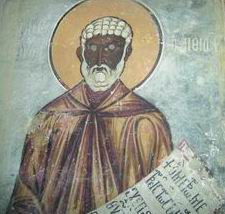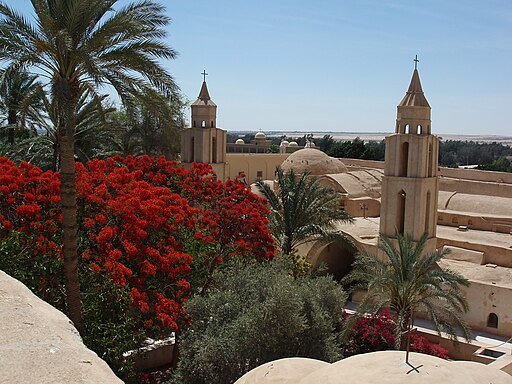Feast Day: August 28
I’m blessed to be where I am. Even a few years ago, I would not have guessed that I’d be sitting here in a region that I love, in a house I just bought, with a wonderful and wise wife downstairs, and our son in her womb. God has been generous to me. He’s given me all these gifts at a point when I thought too many years had gone to hope for these blessings. It isn’t that my life is free of challenges now or that it lacked blessings before, but I am grateful for what I have now and feel awe at how my Father works in His own time to show His love.
Today’s saint is a reminder that God lavishes his patience and generosity on everyone. Some of these are temporal gifts, like my home. Some have eternal worth, like forgiveness. One of those whom God loved with such gifts lived in fourth-century Egypt as a robber, a murderer, and a fornicator. His name is Moses, nicknamed “the Black” on account of his skin, and he is a great saint.

From Murderer to Monk
Many contemporary Christians find the tradition of Saint Mary Magdalene being a former prostitute scandalous; that’s nothing compared to other saints like Moses the Black. Moses may have originally come from Sudan or Ethiopia, but first enters our record being tossed out the door of a Roman-Egyptian official whom he had served. Moses had used his position as a hired servant or slave to systematically steal from the household and sell the loot. Though they couldn’t prove it, the household also suspected him of murder and adultery.
The teenage Moses, already standing a head taller than the average man, threw himself fully into a life of crime. His ferocious focus on getting the job done, his thirst of vengeance against anyone who showed him disrespect, and his physical strength gained him notoriety and a band of followers. Eventually he led dozens of bandits terrorizing the Nile, robbing and murdering travelers and villagers.
The Roman governor had to send in troops to clean up the mess. The infamous outlaw fled into the desert and decided to hide in the sanctuary of a remote community of monks. God touched Moses’ heart there, in the harsh poverty of the desert surrounded by the fervor of these men of constant prayer. Moses saw a path towards something better than a life of hatred and violence. In the peaceful dedication of these men to something beyond material goods and pleasures, Moses glimpsed a good of which he had never before conceived. Moses renounced his old life and became a monk.

Two Lessons from Abba Moses
Moses entered the religious life of poverty, celibacy, and prayer during the first great wave of Christian monasticism. He lived in the desert community of Scetes , growing from novice to one of the respected elders reverently called Abba (“father”), until his death in 405 A.D. at the hands of pagan bandits. Younger Egyptian monks, as well as foreign visitors wishing to take the seeds of monastic life back with them, recorded the life and sayings of these elders while their communities lasted. In Abba Moses, they found a wealth of wisdom of which the following is but a small sample.
The Slow Work of Grace
Moses followed a torturous path to God and found Him only after any reasonable person would have given up on Moses. Even then, Moses didn’t become a saint overnight. He struggled with his sins and with celibacy. One morning, after pre-dawn prayers, he went in frustration to Abba Isidore to complain that he’d never really become a good Christian, much less a monk. Abba Isidore took him up on the roof of his cell and prayed, then told Moses to look. In the dark sky to the west, Moses saw a horde of hideous demons. Frightened, he turned away and saw in the east, above the first rays of the rising sun, an even greater multitude of angels.
Abba Isidore looked at him and said, “There is a battle inside you. Demons tempt you with sins, but know that you have help and it is greater than the forces of evil. Just as the rays of dawn gradually bring light to the earth, so too will God and his heavenly host enlighten your soul if you let them.”
Under Abba Isidore’s guidance, Moses dedicated himself to penance and prayer, but always leavened with charity and moderation. He would, for example, stay awake at night for extra vigils but use that time to fill the water jugs of elderly monks from a distant well to spare them from making the journey under the heat of the desert sun. Moderation he knew would be important for sustaining his penances year after year and for keeping the spirit of humility. He knew better than most that no person is strong enough to save himself. Salvation and sanctification come from God’s grace and happen in God’s own time.
You fast, but Satan does not eat. You labor fervently, but Satan never sleeps. The only dimension with which you can outperform Satan is by acquiring humility, for Satan has no humility.
Moses had the humility to labor long and hard without seeking any reward, trusting that God would make something of it when and if He desired.
Let us ask ourselves: do we have the humility to work for others and for God, putting them first? And do we trust in God’s grace even if we don’t see the results when we want them?
The Forgiveness of Sinners
An extraordinary thing about the Egyptian monks is that they accepted Moses, a known robber and murderer, into their community to live with them. Imagine welcoming an admitted murderer and thief into your home simply because he says he’s sorry about that and won’t do it again! Christians are crazy, at least those willing to take the radical step of practicing true Christianity (I’m not there yet).
Moses’ life is tremendously hopeful for us. God forgave him. That forgiveness without limits is for all of us, no matter how horribly we feel the pain of our sins. Moses never forgot his past life, but he trusted God’s forgiveness and that knowledge spurred him for the rest of his life to serve God humbly. The most famous story of Abba Moses recounts that humble spirit. One day the other elders of the community summoned him from his cell to sit with them to judge a younger monk’s fault. Abba Moses poked a hole in a basket, filled it with sand, put it onto his shoulder, and carried it with him to the chapel where the elders gathered. When they saw him enter with the basket and sand trickling out of the hole, they asked him what he was doing.
And he said to them, “The sands are my sins which are running down behind me and I cannot see them, and, even so, have come to this day to judge shortcomings which are not mine.” When they heard him, they set free that brother and said nothing further to him.
Let us ask ourselves: Are we truly willing to forgive others, even criminals, and give them another chance to live out God’s grace? Do we truly accept that God has forgiven our own sins and healed us?
St. Moses the Black, pray for us that God may grow in us the same faith and forgiveness that He cultivated in your humble heart after He turned you from violence to peace.
If you have a response, thoughts, or questions, please comment at the bottom of the page. Consider subscribing below to get weekly email notifications about new reflections and other news.



Dear Dr Eric
I wish you and your family every happiness in your new home. Accepting God’s timing can be a hard ask!
Thank you for this insightful reflection.
Thank you!
Wow, this was a great reflection on a Saint I have never heard of before!
Congratulations on the house and the baby! I will keep your whole family in my prayers!
Peace,
Brenda
Thank you!